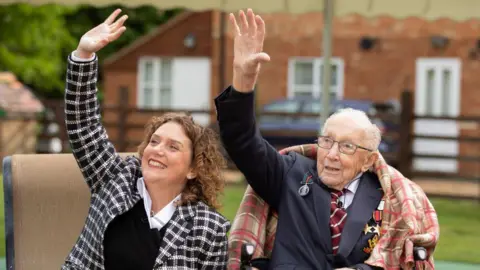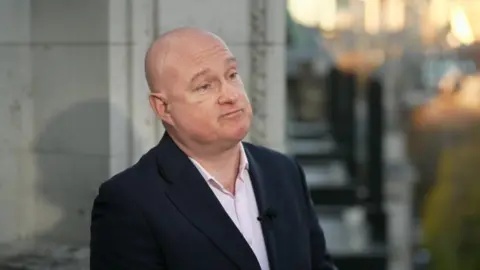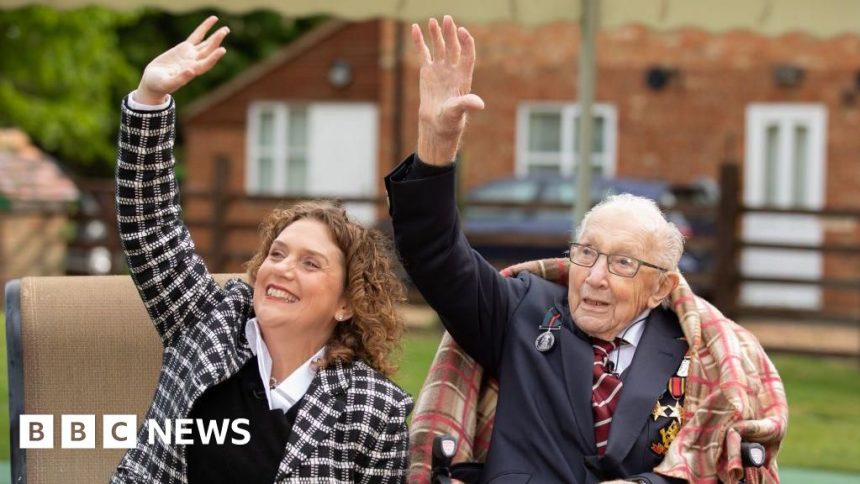‘I was shocked’ by Captain Tom charity, says ex-boss
 Getty Images
Getty ImagesThe former chief executive of the Captain Tom Foundation has told the BBC he was “shocked” and “gobsmacked” by what he found at the charity.
In his first interview, Jack Gilbert said he uncovered what he considered questionable practices and believes Captain Sir Tom Moore’s daughter was partly motivated by self-interest.
It comes after the Charity Commission found Hannah and Colin Ingram-Moore benefited from their association with the charity set up in Capt Sir Tom’s name, including money from a £1.4m book deal paid to a family company, not to the Foundation.
Mrs Ingram-Moore has been contacted for comment.
Capt Sir Tom, a World War Two veteran, became a household name in 2020 during the pandemic after raising millions for NHS charities by walking laps of his garden in lockdown.
After he died in February 2021, the charity watchdog opened an inquiry into the Captain Tom Foundation.

Experienced charity professional Mr Gilbert was appointed to take over as chief executive from Mrs Ingram-Moore and ran the charity for five months before it was mothballed due to the charity commission investigation.
He told BBC News: “When I came in, I must admit, I was gobsmacked.
I was shocked at the number of systems that just did not accord with best practice.
One of my first exercises was, of course, to get trusted charity status for the Foundation, which meant going through a whole range of different hurdles.
And the fact was that although we had done many of them, there were lots of key practices that simply were not in place.”
Mr Gilbert said when he was setting up management accounts in the correct format of a charity, which had not been done prior to his arrival, he said he discovered an invoice to Virgin Media, which had been cancelled.
The Charity Commission found Mrs Ingram-Moore was paid £18,000 for an appearance at the Virgin Media O2 Captain Tom Foundation Connector Awards.
She said the appearance was in a personal capacity and in her own time, but the commission disagreed, saying there was no evidence to support this, and the charity received just £2,000.
“If you’re a chief executive for a charity and you are representing that charity, it is very unusual, unheard of, for the charity not to benefit from activities you’ve done during your working day,” Mr Gilbert said.
He said in his view it was “deeply unethical” for a charity chief executive to benefit personally at the expense of charity activities.
Mr Gilbert said he became “quite suspicious” and reported this payment and other things he found by going through the accounts to the chair, who then reported it to the board.
He said in his view there was a “level of self-interest”.
The commission’s report found a “pattern of behaviour” in which the couple benefited personally from their association with the Captain Tom Foundation and said people “would understandably feel misled”.
The commission called on the Ingram-Moores, who have already been disqualified from being charity trustees, to make a “suitable donation” to the charity in response.
A press release, various marketing materials and the prologue of Capt Sir Tom’s memoir stated that the books would be used to support the foundation.
A spokesperson for the Foundation said they are “pleased with the Charity Commission’s unequivocal findings regarding the Ingram-Moores’ misconduct”.
Mr Gilbert added the foundation was a “lost opportunity”.
“The point of the idea that we had was to create a charity that would address ageism, that would enable people to work when they were older, to create connections between older people who are isolated in the wider community,” he said.
Responding to the charity watchdog’s report, the Ingram-Moores argued it was a “breach of privacy” for the book deal to have been disclosed by the Charity Commission and said “significant fees” were paid to the literary agent, legal and PR professionals, with portions of the money used to support the Captain Tom Foundation.
The Ingram-Moores said there had been no misappropriation of funds from the charity and that they had been treated “unfairly and unjustly” by the inquiry.
Additional reporting by Jon Ironmonger






